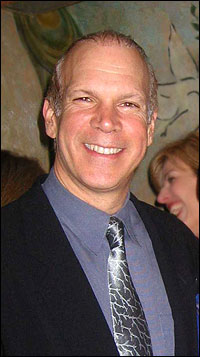
Director-conceiver David Zippel's 2009 production for California's Rubicon Theatre Company resurfaces through July 3 as part of 59E59 Theaters' Americas Off Broadway series that gives New York exposure to regional not-for-profit troupes. Opening night is May 25.
The Best Is Yet to Come: The Music of Cy Coleman features David Burnham (Wicked), Tony Award nominee Sally Mayes (She Loves Me, Welcome to the Club), Tony Award nominee Howard McGillin (The Phantom of the Opera, Anything Goes, The Mystery of Edwin Drood), Billy Stritch (Liza's at the Palace), Tony Award winner Lillias White (The Life, Fela!, Barnum) and Rachel York (City of Angels).
Lyricist Zippel, of course, shared a Best Score Tony Award with Coleman for City of Angels. They were working on a handful of other projects when Coleman died in 2004. The Best Is Yet to Come includes the New York premiere of songs from two unpublished Coleman musicals, as well as his hits from City of Angels, Sweet Charity, Barnum, The Life, The Will Rogers Follies and Little Me, and many of the standards he wrote (with lyricist Carolyn Leigh) that were made famous by Frank Sinatra, Tony Bennett and Barbra Streisand.
An eight-piece onstage band sweetens the experience. Musical direction is by Billy Stritch. Orchestrations are by Don Sebesky. Lorin Lataro again choreographs. The creative team includes costume designer William Ivey Long, set designer Douglas Schmidt, lighting designer Michael Gilliam and sound designer Jonathan Burke, all of whom were involved in the tryout production in California. The production stage manager is Christina Burck.
| |
 |
|
| David Zippel | ||
| photo by Aubrey Reuben |
Tickets range $45-$65. For information, visit TicketCentral.com or 59e59.org.
*
The Santa Barbara Independent's Indy Awards for theatre recognized the show in two categories in 2010: Zippel was cited for his direction of the production by Rubicon Theatre Company, and Tony Award winner Lillias White (and a 2010 nominee for her work in Fela!) won for her performance. Zippel accepted his award in person at the late May 2010 ceremony.
For her work in The Best Is Yet to Come, White had previously been nominated by the L.A. Ovation Awards, in the category of Lead Actress in a Musical. Billy Stritch got Ovation nominations for his arrangements/musical direction.
Coleman's hits include "Big Spender," "Withcraft," "Firefly," "Hey, Look Me Over!," "If My Friends Could See Me Now," "The Best Is Yet to Come" and more.
The California world premiere of The Best Is Yet to Come, devised and directed by his pal and collaborator Zippel, played the Rubicon Theatre in Ventura, CA, July 9-Aug. 2, 2009. The starry cast included David Burnham, Jason Graae, Sally Mayes, Julia Murney, Billy Stritch and Tony Award winner Lillias White.
As previously reported on Playbill.com, The Best Is Yet to Come dipped into the deep well of Coleman's catalog, offering classic and obscure numbers he wrote with a variety of lyricists, including Alan & Marilyn Bergman, Betty Comden & Adolph Green, Dorothy Fields, Ira Gasman, Carolyn Leigh, Michael Stewart and David Zippel.
"His body of work was so extraordinary it would be exciting to see it in revue form, and I had had talked to Cy about it years ago," Zippel previously told Playbill.com. "He told me: 'That's for after I'm gone; let's write something new.'"
Zippel, who, with Coleman, also wrote the yet-to-be produced comic Napoleon musical, N, contacted the composer's widow, Shelby, and she enthusiastically agreed to move forward with a revue, the lyricist said.
Coleman, a native New Yorker, was born Seymour Kaufman. He played classical music at Carnegie Hall and Town Hall as a child, but as an adult heard the siren call of jazz, pop and theatre music and never looked back. Working with the lyricist Carolyn Leigh in his early writing career in the late 1950s and '60s, he penned such hits as "Witchcraft," "The Best Is Yet to Come," "You Fascinate Me So" and "When in Rome."
Leigh and Coleman would venture into the musical theatre, writing the scores to the Lucille Ball vehicle Wildcat (which offered the tune "Hey, Look Me Over!") and Little Me (which boasted "Real Live Girl" and "I've Got Your Number"). There was friction in the relationship. Pianist Coleman and his Cy Coleman Trio were playing engagements around the country, and Leigh wanted him to stay put in New York and focus on writing musicals.
Though Coleman did settle down to a theatre-writing life, he and Leigh did not write another show. With the legendary lyricist Dorothy Fields, he wrote "Where Am I Going?," "If My Friends Could See Me Now," "Big Spender" and "There's Gotta Be Something Better Than This" for Sweet Charity, Bob Fosse and Neil Simon's 1966 reimagining of Federico Fellini's "Nights of Cabiria." In the musical fable, Gwen Verdon starred as a dance hall hostess named Charity Hope Valentine (in the film, Cabiria is a prostitute).
The show's second Broadway revival (following the Fosse-staged first revival in 1987) surfaced in 2004-05, months after Coleman's death, although the composer had signed off on changes.











